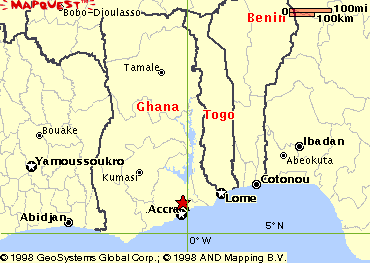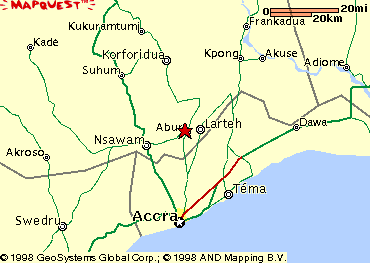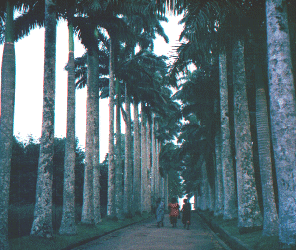Life on the Equator
 Well, almost. My house was within hiking distance of the Greenwich meridian but
just over 5 degrees North latitude (see left and below). I lived in
Aburi,
only 30 miles North of Accra,
but those 30 miles made a huge difference because Accra/Tema is a port while Aburi
is in the Akwapem hills, at 1200 feet elevation. What this meant, among other things, was
terrific weather all year round and no mosquitoes!
Well, almost. My house was within hiking distance of the Greenwich meridian but
just over 5 degrees North latitude (see left and below). I lived in
Aburi,
only 30 miles North of Accra,
but those 30 miles made a huge difference because Accra/Tema is a port while Aburi
is in the Akwapem hills, at 1200 feet elevation. What this meant, among other things, was
terrific weather all year round and no mosquitoes!
But, first things first.
Ghana,
formerly Gold Coast when still a British colony, is a
country about the same size and shape as Oregon. You will notice that it has a very big lake.
This is a man-made lake due the construction of
Akosombo dam,
on the Volta river, which supplies nearly all domestic electricity. Lake Volta takes up about four
percent of the area of Ghana. The story is that it was not intended to be so large but the
surveyors who measured the surrounding countryside overestimated the slope a bit. Therefore,
there are a lot more fish for sale than there used to be. The last time I rode the ferry,
you could look down into the water and see trees. Very strange!
 The southern half of Ghana is forested; the upper half is semi-desert. Just about everything:
geography, climate,
language,
ethnicity, religion, flora, fauna, agriculture, etc., is different between the
two halves. They could almost be two different countries -- probably not a politically-correct
thing to say but quite true.
The southern half of Ghana is forested; the upper half is semi-desert. Just about everything:
geography, climate,
language,
ethnicity, religion, flora, fauna, agriculture, etc., is different between the
two halves. They could almost be two different countries -- probably not a politically-correct
thing to say but quite true.
Of course, this is true of many countries in Africa. Contemporary national
boundaries often make little sense, sociologically. In all fairness, it is unlikely that one could come up with a
viable set of boundaries that did make sense. There are just too many differences of too many kinds.
For example, within a few miles of Aburi there is a village where many of the inhabitants
speak a language that is unique, spoken by no one else in the whole world. Ghana is, in many ways, a
pastiche of remnants quilted together with much enthusiasm but little expertise. That Ghanaians have
succeeded so well in forging a nation, with a relatively modest amount of dissention, is an enviable testament to
their character and mutual respect.
 Aburi is a small town that was, in colonial times, a retreat for official visitors and others who needed to get away
to a comfortable spot near the coast. Perhaps its greatest attraction is the
botanical garden (left).
However, it is also the location of two secondary schools:
Aburi Girls' Secondary School (where I taught) and Adonten Secondary School, a day school in the town itself.
Aburi is a small town that was, in colonial times, a retreat for official visitors and others who needed to get away
to a comfortable spot near the coast. Perhaps its greatest attraction is the
botanical garden (left).
However, it is also the location of two secondary schools:
Aburi Girls' Secondary School (where I taught) and Adonten Secondary School, a day school in the town itself.
The vast majority of secondary schools in Ghana are boarding schools, usually located far from seductive city
lights and other distractions. This was the case at my school. Consequently, our daily routine was highly regimented.
The first bell would ring before six in the morning and all subsequent activities were heralded in similar fashion.
As a teacher, I could ignore any bells that did not apply to me. (I never did get up at 5:45 AM when the students did.)
Nevertheless, there was plenty to do. At a boarding school, tasks are distributed democratically. Anyone with a pulse
was fair game for whatever had to be done. Thus, not only did I teach chemistry and general science, but I also
supervised sports, "prep" (homework sessions), and various extracurricular activities. Every day was filled to capacity.
We had about 500 students and two dozen teachers, and we were all very busy, all the time.
Our school was an exceptionally good one and students came from every part of Ghana. The faculty were an eclectic group as
well. During my time(s) there, we had mostly Ghanaian teachers, of course, but we also had (U.S.) Peace Corps volunteers,
CUSO (Canadian Peace Corps) volunteers, VSO (British volunteers), one French teacher (doing his military service),
misssionaries, contract teachers, and others. Academically, the student body was divided into high school (Forms 1-5) plus
Lower and Upper Sixth Forms. This is the traditional British arrangement. Consequently, the ages of the students ranged
from 11 to 21.
Unlike the United States, getting into high school in Ghana is very competitive. After middle school, all students sit for
their Common Entrance exams. These are like College Boards for (typically) 11-year-olds except that they matter a lot more. The students
send their grades to the high schools that they would like to attend and, if they do well enough, they might get accepted. At our
school, every summer brought hundreds of prospective students to Aburi to be interviewed, individually, by the headmistress.
In many cases, they brought along a resumé or portfolio, especially if they wanted to study art. Most were not
accepted, to Aburi Girls' or anywhere else. There were far more applicants than the high-schools could ever accommodate.
(Hence the competition.)
At the end of Form 5, all students have to take "O-Level" exams in every subject. These really are like College Boards but they last a
week and, again, they are far more significant. Students who get into Sixth Form usually go to a different school. (In Ghana,
only a few secondary schools have a Sixth Form.) At the
end of this two-year sequence, these students take their "A-Level" exams and, if they do really well, they can apply to go to a
university. Since I was raised in the U.S., all of these various exams were a novelty but I came to appreciate them very quickly.
They provide a robust standard, something obviously lacking here in the United States. From a teacher's point of view, they are
also a lot of fun. As a chemistry teacher, I had to prepare and standardize the chemistry "practical exams" for our O-Levels
and A-Levels. These are laboratory exams. That is, instead of just being given a test with questions on it, the students
had to perform quantitative experiments with known answers. The answers were known because I had to do the same experiments (secretly),
with the same kind of equipment, at the same time. Interesting, yes?
And where were the rest of the Peace Corps volunteers in my group? Well, as it turned out, after a few days of orientation upon
arrival, I never saw most of them again. We were very much on our own. I did visit the Peace Corps office in Accra once or twice,
to get refills for my first aid kit, etc. but, apart from that, I was just another teacher.
There is no way to do justice to my overseas experience in a web page. My two years in the Peace Corps was only the beginning. Later,
from 1971 to 1975, I returned to Ghana, to the same school, as a contract teacher. Everything, even the pay, was much the same.
Needless to say, I really enjoyed my time in Africa.
[For more information on Ghana, click here.]
Interspersed with these tropical forays was a wintry sojourn back to New England. As noted earlier, my intention was to postpone
graduate school, not dispense with it altogether. I still had to get my Ph.D. and so I traded Aburi for
Amherst.
 The southern half of Ghana is forested; the upper half is semi-desert. Just about everything:
geography, climate,
language,
ethnicity, religion, flora, fauna, agriculture, etc., is different between the
two halves. They could almost be two different countries -- probably not a politically-correct
thing to say but quite true.
The southern half of Ghana is forested; the upper half is semi-desert. Just about everything:
geography, climate,
language,
ethnicity, religion, flora, fauna, agriculture, etc., is different between the
two halves. They could almost be two different countries -- probably not a politically-correct
thing to say but quite true.
 Well, almost. My house was within hiking distance of the Greenwich meridian but
just over 5 degrees North latitude (see left and below). I lived in
Aburi,
only 30 miles North of Accra,
but those 30 miles made a huge difference because Accra/Tema is a port while Aburi
is in the Akwapem hills, at 1200 feet elevation. What this meant, among other things, was
terrific weather all year round and no mosquitoes!
Well, almost. My house was within hiking distance of the Greenwich meridian but
just over 5 degrees North latitude (see left and below). I lived in
Aburi,
only 30 miles North of Accra,
but those 30 miles made a huge difference because Accra/Tema is a port while Aburi
is in the Akwapem hills, at 1200 feet elevation. What this meant, among other things, was
terrific weather all year round and no mosquitoes!
 Aburi is a small town that was, in colonial times, a retreat for official visitors and others who needed to get away
to a comfortable spot near the coast. Perhaps its greatest attraction is the
Aburi is a small town that was, in colonial times, a retreat for official visitors and others who needed to get away
to a comfortable spot near the coast. Perhaps its greatest attraction is the